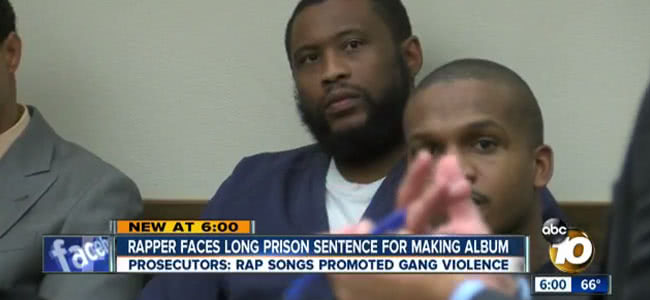A California-based rapper is facing a lifetime prison sentence simply for doing what rappers do every day and putting out an album. As ABC 10 reports, San Diego hip-hop artist Tiny Doo could potentially be incarcerated as the result of an obscure California law.
Tiny Doo, real name Brandon Duncan, and 14 other gang members are currently facing charges of attempted murder stemming from nine local shootings that have occurred since April 2013. While the emcee hasn’t officially been tied to the murders, prosecutors are looking to charge Duncan anyway.
According to ABC 10, prosecutors are looking to link Duncan’s latest album, No Safety, to a piece of Californian legislation from 2000 that states gang members can be prosecuted if they somehow “benefit” from crimes committed by other gang members.
Prosecutors claim that No Safety makes Duncan’s gang affiliations clear, and that as a result of the gang’s increased notoriety, Duncan has capitalised on the shootings through boosted record sales. The case marks the first time that the law has ever been enforced.
During a preliminary hearing, Deputy District Attorney Anthony Campagna highlighted the album’s cover art as evidence that Duncan was benefitting from the crimes of his gang. “We’re not just talking about a CD of anything, of love songs. We’re talking about a CD [cover] … there is a revolver with bullets,” said Campagna.
But Duncan’s attorney, Brian Watkins, calls the claims “a reach”. “It’s shocking. He has no criminal record. Nothing in his lyrics say go out and commit a crime. Nothing in his lyrics reference these shootings, yet they are holding him liable for conspiracy. There are huge constitutional issues,” he said.
Meanwhile, Thomas Jefferson School of Law professor Alex Kreit is questioning whether the charges are constitutionally sound. “Where does that end if that’s the definition of criminal liability?” he told ABC 10.
“Is Martin Scorsese going to be prosecuted if he meets with mafia members for a movie for his next film? The Constitution says it can’t be a crime to simply make gangster rap songs and hang out with people that are committing crimes. You have to have more involvement than that.”
The hearing is set to resume this week, with the judge presiding over the case set to decide whether it will go to trial. Readers can check out ABC 10‘s report on the story, followed by a stream of No Safety below.




































